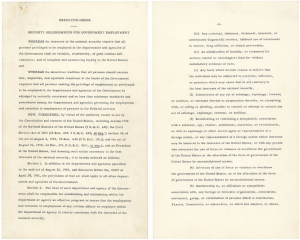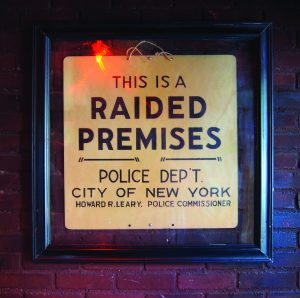Legal Persecution

Courtesy: National Archives
The need for privacy in many gay bars sprung from the fact that homosexuals, as gays and lesbians were called throughout much of the twentieth century, faced persecution at the national, state, and local levels. Numerous laws related to employment, housing, and even social gathering explicitly discriminated against homosexuals.
In 1952 President Dwight D. Eisenhower signed Executive Order 10450, which barred gay and lesbian Americans from being employed by the federal government. With the excuse that a federal employee could be blackmailed because of their sexuality, the federal government targeted gays and lesbians in what became known as the Lavender Scare. As a result, thousands of workers accused of engaging in homosexual activity lost their jobs. It was not until 1977 that the federal government would hire openly gay employees.
Prohibited Gatherings

Courtesy: Rhododendrites/Wikimedia Commons
Many local officials also felt that the regular gathering of gays and lesbians constituted a threat to America’s morals. Police regularly raided bars and restaurants suspected of being friendly to gays and lesbians. Many were beaten, arrested, and charged with “disorderly conduct.” Those not formally arrested in a raid could still find their names in the local paper as a form of public shaming. This often resulted in a loss of jobs, residences, or worse, all for the simple act of gathering in a public space.
In the late 1960s, police stopped two women near the Colony Club, a popular homosexual bar on Troost Avenue in Kansas City. One was a schoolteacher, while the other worked for a local judge. Though neither woman was charged with any crime, both were fired from their jobs within 24 hours for being seen near a gay-friendly business.


